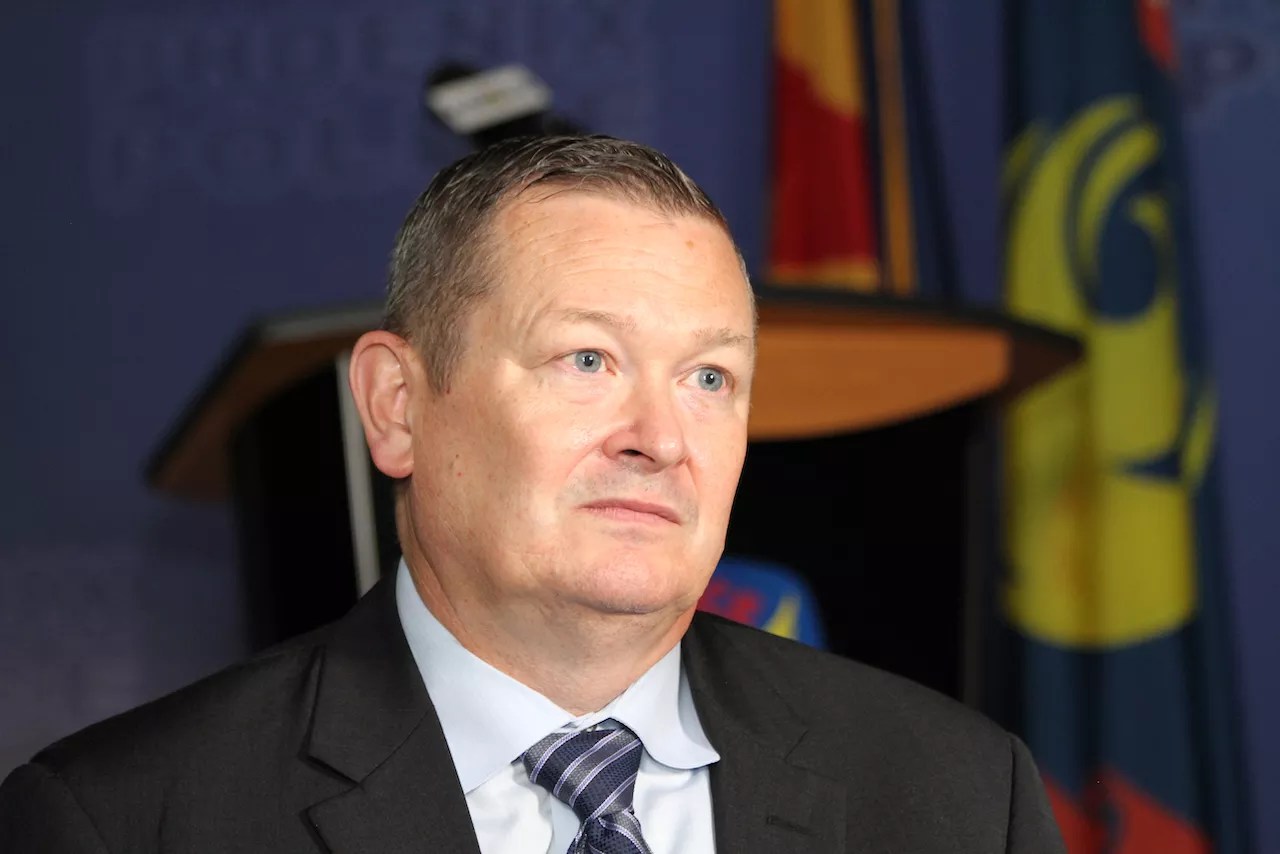
Matt Hennie

Audio By Carbonatix
The Phoenix Police Department is changing its use-of-force policy, which now suggests stricter standards for officers at an agency with a long and troubling history of force.
The agency released a partial draft of the new policy for public comment this month. The proposed changes are some of the first major policy changes under Chief Michael Sullivan, who took charge of the agency in September. Sullivan was hired specifically to help the department address the wide-ranging and ongoing probe by the U.S. Department of Justice.
One major prong of the DOJ investigation is the agency’s use of force, which has spurred years of protests and wrongful death lawsuits. It’s no surprise, then, that Sullivan’s first key policy changes are in this area.
The department says that “all comments will be reviewed and taken into consideration before the policy is finalized.” The feedback form will remain open until Tuesday.
The agency has not provided the full draft of the policy. Sections that involve reporting requirements for force and other important guidelines were not disclosed. Still, what was provided for public comment introduces new restrictions on the use of force by officers, revisions that drew tentative praise from activists and backlash from cops.
“The Phoenix police are one of the most violent police forces in the country,” said Jared Keenan, legal director of the American Civil Liberties Union of Arizona. He added that the agency is often “secretive” about misconduct and discipline.
“I think it’s long overdue that the Phoenix police should have strengthened their use of force policy to make it clearer that the types of actions that they have engaged in are problematic and should no longer continue,” Keenan said.

An attorney who represents officers accused of misconduct has criticized changes that would tighten Phoenix police’s use-of-force policy.
Matt Hennie
A Stronger Policy on Force
Despite requesting the public’s feedback on the new draft, the department did not give a rundown of what changes it made to the draft policy – a nine-page document called “Use of Force.” But the current policy governing force – “Response to Resistance” – is publicly available and was last revised in July 2022.
Large portions of the two versions of the policies are similar, including sections on de-escalation and the need for force to be “reasonable.” But the new policy includes a note indicating that its standards for force have been tightened. “The standards established by this Department policy are deliberately stricter than the Constitutional and legal minimums established by the Courts,” it reads. “These more rigorous standards for use of force must be complied with.”
That policy change has frustrated some police advocates. Steve Serbalik, an attorney who frequently represents officers accused of misconduct, bashed the policy for its stricter standards in a video released on January 15. He called it “completely divorced” from legal standards for police use of force. “This new policy proposal is downright dangerous,” he said.
Keenan pushed back on the idea that a policy stricter than the limited federal standards for force by officers is problematic. “When you’re talking about a police department that routinely engages in unnecessary uses of force and quite violent uses of force with no accountability whatsoever, I think you need much more sweeping and much stronger policies – at the very least,” he said.
The new policy authorizes force only when it is “reasonable, necessary, and proportional” – a standard that is more stringent than Phoenix’s current policy and an approach gaining favor in other agencies. Police departments in Seattle and Chicago have a nearly identical standard.
The new policy also clarifies what actions are considered to be deadly force, which in its current policy is vaguely defined. “Strikes to a person’s throat” and “chokeholds/neck holds” are now clearly defined as deadly force, as are “kicks to a person’s head.” The policy also expands the definition of so-called “use of force incidents” to any actions that cause pain, such as bending a person’s wrist to gain compliance.
In Keenan’s view, there’s a pattern to the changes. “It’s hard to read this revised policy as something other than, in many ways, a direct response to specific acts of violence that the Phoenix police have perpetrated in the past,” he said.
For instance, the new policy expressly prohibits “discharge of a less-lethal launcher to the head, neck, sternum, spine, groin, or kidneys at close range” except in cases that warrant deadly force. In 2017, a Phoenix cop shot a protester in the groin with a pepper ball. Officers on the force later created memorabilia celebrating the incident, which turned into a major scandal.
The policy also prohibits force against “persons who are handcuffed or otherwise restrained,” which is not discussed in the current policy. This also has been a historic problem for the department. In 2017, a man named Muhammad Muhaymin died after multiple officers pinned him to the ground as he was being handcuffed. In October, two Phoenix officers beat a handcuffed man on video and may face criminal charges.
Keenan questioned whether the new policy will make a difference. “Will these policy changes simply be ink on paper? Or will they actually be able to change a very broken and corrupt culture at the Phoenix Police Department,” he asked.
In December, Sullivan announced a four-step plan to make changes at the department, including a review of the department’s use-of-force policy and expanding the arsenal of nondeadly tools officers can use while on patrol.